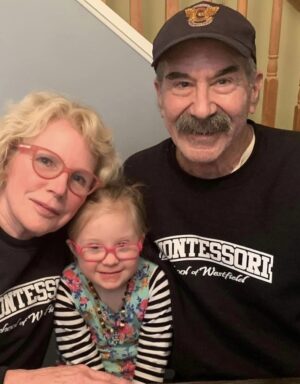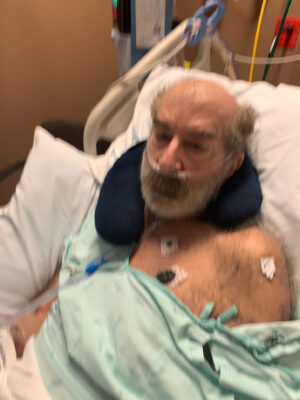





Medical Information
Medical Treatment & Hospitalization
He had to wait 4 hours for tissue and cough syrup. He needed to go to the bathroom and no one came so he got up and ripped his catheter out. No one cleaned catheter and he got a UTI. Crap on toilet for days. His room was never cleaned. He had to take a stress test to leave hospital and was without food and water for 34 hours which in turn they sent him back to ICU. I would say literally he was neglected.
Activism & Follow-up
Watch & Share The Interview
Written by William Lyman
HOSPITAL DOCTOR TELLS WIFE THAT HUSBAND IS DYING WITH CONGESTIVE HEART FAILURE BUT PREVIOUS DAY CARDIOLOGIST TELLS WIFE THAT HER HUSBAND’S HEART IS GOOD
Hospital Staff Neglects Husband, but With Wife’s Care, He Improves
On January 13, 2022, I drove my 76-year-old husband to the hospital because of low oxygen levels. He had Covid in December and developed pneumonia. He walked into the emergency room, and within minutes, they told him he would probably have to go on a ventilator. My husband’s immediate response was, “no, I am not!” After my daughter and I got him checked into the emergency room, they called for an ambulance to take him to the main hospital about six miles away.
Once we reached the hospital, he was immediately placed in the Intensive Care Unit (ICU) after having a negative Covid test. He had oxygen for two-plus hours, fluids, and antibiotics at that time. And was sitting up laughing and talking to the nurses. I felt immediate relief that he would be okay. Three Covid tests later, they got a positive, and then things started to change. Only one visitor per day, and once you left ICU, you could not come back into his room. I wore a gown, gloves, and two masks per protocol. I was not allowed to drink or leave to go to the bathroom. The nurses could come and go, but I could not. The admitting nurse, Lori, told my daughter and me on Friday that she did not think he had Covid since he had it in December, and he was eating and sitting up and talking to the nurses and doctors. She said she would be surprised if it came back positive. Well, it did. And we never saw her again, and I was there every day, ten hours a day. She was supposed to come to see him on Monday, but that did not happen.
On the night of January 14, my husband could not quit coughing, and they put a CPAP on him and then gave him a sleeping pill. When I came the following day, they told me he was having a panic attack because he couldn’t breathe. He told them in front of me that he was coughing and needed cough syrup. And the nurse said, “why didn’t you tell us?” Then the nurse said, I think we are going to put him on “Remdesivir,” and I said, “no, we don’t do that stuff.” Three doctors came in separately asking him if he was going to die, would he go on a ventilator, and three times he said, “no, let me die.” At that point, the nurse said, “I don’t think we will start the Covid protocol today. Why? Because he was eating three meals per day plus food I brought, taking supplements, and was getting better within two days.
On January 15, his pulmonary doctor came in with no mask, no gown, and no gloves and asked him to go on a steroid, and he and I both said, could we discuss this first? Dr. Dickhead, as my daughter called him, came across the bed, shaking his finger in my face, and said, “you will do what I tell you to do. Your husband is dying and has congestive heart failure.” He said this after the heart doctor had called me the day before and said your husband’s heart is good, and you can tell he has worked hard his whole life. A little background on my husband: he is lean, intense, occupation as a builder, has never taken medication for any heart issues, and has no diabetes, cancer, etc., and that was his first time in the hospital since a tonsillectomy at the age of six. He could fight pneumonia with the correct protocol, antibiotics, etc.
After seven days in the ICU, he was moved to a regular room. He left the ICU because he was eating and having bowel movements, and they said people in the ICU with Covid don’t eat or go to the bathroom. I told them he never quit eating or having bowel movements at home. In the new hospital room, he continued to get better, and they planned to release him on January 27, 14 days after arriving. But, he had to pass a stress test with no food or water after midnight. They came and got him around 10 AM for the examination and brought him back to the room around noon. At this time, he had gone 12 hours with no food or water. At 2 PM, we were waiting on the doctor to say he could have water or food. At 4 PM, we were still waiting, and then he had to get up on the mobile toilet to have a bowel movement. His blood sugar dropped, and he was nauseous, still having had no food or water. We are 18 hours into the “test” and still no water or food. They gave him a low dose of Prozac at my request to calm him down, and he went to sleep.
When I returned the following day, he had gone 34 hours with no food or water; he was delirious with a fever, and they moved him back to ICU. This was Thursday, January 27. He went to the ICU and I waited to go in to see him when the head ICU nurse came into the hall and told me to go sit in the waiting room because I was bothering people in the hall. They told me it would be 20 minutes and then I could see him; it was 90 minutes before they let me in his room. The head nurse had so much anger in her eyes. I totally ignored her and waited in the hall. When getting to his room with the food I brought him, the nurse proceeded to tell me he was septic and could not eat. He ate anyway in front of her and within two hours, his fever went from 102 to 97.8.
They took him down for an MRI to make sure his kidneys were okay. They did their first lung x-ray in over 2 weeks. The nurses asked me to step out of the room for the x-ray. While in the hallway I heard all of the ICU nurses laughing loudly about how much money the hospital gets for the tests. On Saturday, January 29, they moved him back to the regular room. On Sunday he insisted to the doctor that he go home the next day and let his wife take care of him because I had been taking care of him in ICU and the regular room ten hours a day, anyway.
He also contracted E-Coli and a urinary tract infection, which he had never had in his life. We asked for water, cough syrup, and Kleenex and had to wait four hours for a nurse to answer the call. His room was dirty, never cleaned, and crap on the toilet for days. He called the front desk because he needed to get up to go to the bathroom. No one came so he got up himself, and pulled his catheter out. On Monday, January 31, the urologist came in with a heavy-duty antibiotic to take for 14 days, and the oxygen was set up to be delivered that evening.
I took him home around 4 PM. He climbed the stairs to the second floor. I continued to take care of him and he was off oxygen on February 14 and went to his youngest granddaughter’s birthday party on February 16. He went back to the church that weekend. In May he went back to work a couple of hours a day and now he is almost fully recovered.
When I look back, I could see him getting sicker and sicker in the hospital. At home, he has improved daily with supplements, fluids, exercise, and continuing to move. In my opinion, he was an easy target, 76 years old, and a positive Covid test.
The second picture is 30 days after arriving at the hospital. Thank you for reading his story.
These are just a few of the cases archived by our COVID-19 Humanity Betrayal Memory Project, and there are more being reported by survivors and families of victims every day. If you would like to help with this project, please contact us at email@chbmp.org.

